Products
Products
UV–vis–NIR miniature spectrometer
The VS7000 UV–vis–NIR miniature spectrometer from HORIBA Jobin Yvon is a preconfigured, low stray light system that includes an uncooled back-illuminated CCD and USB-2 integrated electronics. The spectrometer is designed for OEM low light, high SNR requirement applications. The instrument also includes a selection of slit widths, integrated OSF, and three spectral range selections: 200–860, 380–750, and 200–1050 nm. HORIBA Jobin Yvon, Inc., Edison, NJ; www.horiba.com/scientific/VS7000
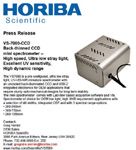
LC–MS system
The amaZon Powerpack LC–MS system from Bruker Daltonics is designed for laboratories involved with detailed structural analysis of various molecules. The system combines the company's amaZon SL ion-trap mass spectrometer and a Dionex Ultimate 3000 UHPLC system. According to the company, features include automated, intuitive software; data acquisition at isotopic resolution in MS and MS-MS modes for use with UHPLC; on-the-fly polarity switching; reproducible fragmentation for unknown compound identification; and low maintenance requirements. Bruker Daltonics, Billerica, MA; www.bruker.com
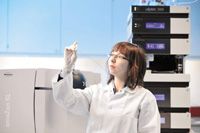
Microwave digestion system
Milestone's UltraWAVE benchtop microwave digestion system is designed to provide shorter turnaround times for digestion of samples for trace metals analysis, including high matrix samples for analysis by collision-cell ICP-MS. The system uses disposable glass vials instead of traditional digestion vessels. The system features the company's single reaction chamber (SRC) technology. Milestone Inc., Shelton, CT; www.milestonesci.com
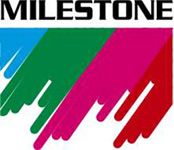
Thin-film analyzer
The Photovoltaic (PV) Hyperspectral analyzer from Photon etc. is designed for the analysis of thin-film photovoltaics with copper indium gallium diselenide compounds. The system reportedly is applicable to most heterogen materials. According to the company, the reflectance and photoluminescence spectral imaging system's sensitivity allows each component of the photovoltaic material to be characterized for assessing the properties of individual cells. Photon etc., Montreal, Canada; www.photonetc.com

ICP emission spectrometer
Shimadzu's IPCE-9000 Multitype ICP emission spectrometer can be used for analyzing substances ranging from metals to pharmaceuticals. The spectrometer includes a 1-in. CCD detector with increased pixel size and an echelle spectrometer designed for high-speed measurements with increased resolution. The instrument reportedly runs at a high cooling temperature for a shorter initial stabilization period and long-term stability. According to the company, the system's mini-torch reduces argon gas consumption by half that of conventional torches. The instrument uses a vacuum spectrometer equipped with semiconductor detectors, which reportedly prevents contamination and decline in sensitivity over long-term use. Shimadzu Scientific Instruments Inc., Columbia, MD; www.ssi.shimadzu.com
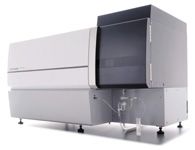
ICP application note
An application note from Teledyne Leeman Labs describes oil additives analysis with the company's ICP system. The note, titled "The Analysis of Oil Additives Using the Prodigy High Dispersion ICP," demonstrates the instrument's ability to determine a range of elements in two oil additive sets. According to the note, the instrument can be used to provide accurate and reliable results for a suite of elements in oil additive samples using a radial plasma. Teledyne Leeman Labs, Hudson, NH; www.leemanlabs.com
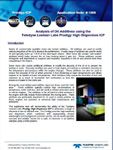
Fluorescence spectrophotometer
The F-7000 fluorescence spectrophotometer from Hitachi is available with a 96-well microplate reader accessory that mounts in the front of the instrument. The accessory reportedly allows measurement of a 96-well plate in 60 s. The instrument includes a standard cell holder that can be mounted or removed for switching from microplate to cuvette without removing the microplate reader accessory. The accessory enables wavelength scanning, time scanning, and quantitative analysis of samples in the individual wells. When cuvettes are used, 3-D scanning and 3-D time scan modes are available as well. The instrument's standard wavelength range is 200–750 nm, and 200–900 nm is optional. Hitachi High Technologies America, Inc., Pleasanton, CA; www.hitachi-hta.com/LShome
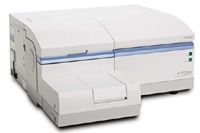
X-ray diffractometer
The Empyrean X-ray diffractometer from PANalytical is designed to measure sample types ranging from powders to thin films as well as nanomaterials and 3D objects. Users reportedly can switch between application setups using the company's PreFIX modules. The instrument includes dedicated software incorporated in predefined programs along with a customizable desktop and batch sample capabilities. The diffractometer's slurry flow cell enables the use of a range of solvents with varying pH at nonambient temperatures for pharmaceutical applications such as crystallization from supersaturated solutions. PANalytical Inc., Westborough, MA; www.panalytical.com
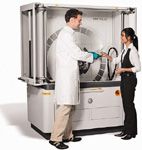
FT-IR analyzer
The ML analyzer with DialPath from A2 Technologies is an FT-IR spectrometer designed for the rapid analysis of liquids. The instrument, which has a footprint of 8 in.2 , includes a tumbler-like optical head that can be rotated into position to provide one of three factory-set, selectable sample pathlengths between 30 and 250 µm. A liquid sample drop is placed on a stationary IR-transparent window mounted on top surface of the analyzer, and a second window is rotated into position, thus sandwiching the sample between the windows. A2 Technologies, Danbury, CT; www.a2technologies.com
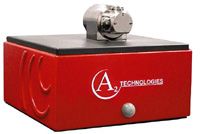
Website
SPEX CertiPrep's website enables users to search and order organic and inorganic certified reference materials. The website also features a custom standard request form and live chat for access to the company's support staff. Available products include Claritas PPT Standards for ICP-MS and trace ICP-AES/OES analysis. Single- and multielement solutions are available for environmental, semiconductor, and clinical applications. A Lab Stuff section offers products for preparation of ultrapure acids as well as the OdorEroder odor elimination product. SPEX CertiPrep, Metuchen, NJ; www.spexcertiprep.com
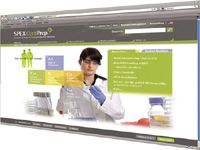
UV–vis spectrophotometers
The Evolution 200 UV–vis spectrophotometers from Thermo Fisher Scientific feature the company's INSIGHT software with customized scripting capabilities. Three models are available for applications ranging from standard quantitative analysis to research life science assays. According to the company, the instruments are designed for routine QA/QC analyses in the life science, food and beverage, and material science industries and for fast data collection rates for kinetics measurements (up to 100 data points/s). The instruments are available in both local and computer-controlled configurations. Thermo Fisher Scientific Inc., Madison, WI; www.thermoscientific.com/evo200
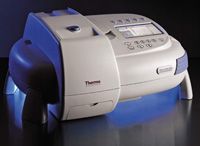
Raman spectroscopy filters
BragGrate notch and bandpass filters from Optigrate are designed for Raman spectroscopy applications. The filters have a bandwidth less than 10 cm-1 . According to the company, the filters enable the measurement of ultralow-frequency Raman bands using standard instruments and can withstand temperatures as high as 450 °C. The filters are available for Raman laser source wavelengths 488, 514, 532, 633, 785, and 1064 nm as well as custom wavelengths in the range from 450 nm to 2 µm. OptiGrate Corp., Orlando, FL; www.optigrate.com
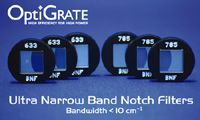
FT-IR spectroelectrochemical accessory
An FT-IR spectroelectrochemical accessory from PIKE Technologies is designed for in-situ studies of redox processes and of electron transfer mechanisms. The accessory's spectroelectrochemical cell is configured on the company's variable-angle specular reflectance/ATR VeeMAX platform. Experiments reportedly can be performed in either ATR or specular reflectance sampling mode. According to the company, the angle of incidence can be varied to optimize spectral results, and the ATR crystal and specular reflectance window can be removed from the cell mount to change the crystal or window type or coat the ATR crystal. PIKE Technologies, Inc., Madison, WI; www.piketech.com
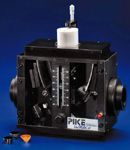
FT-IR spectrometer
Thermo Fisher Scientific's Nicolet iS5 FT-IR spectrometer is designed for product assurance testing, basic troubleshooting, and chemistry teaching. The small-footprint spectrometer reportedly provides performance comparable to full-size spectrometers. The instrument reportedly is powered by the company's OMNIC software and includes an open-architecture sample compartment that accepts various sampling accessories. According to the company, the spectrometer can be used for raw materials, impurities, and mixtures identification. Thermo Fisher Scientific Inc., Madison, WI; www.thermoscientific.com/ftir
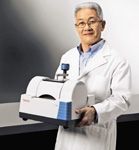
Metals analysis system
Thermo Fisher Scientific's metals analysis system combines the ARL OPTIM'X WDXRF slag analyzer with the ARL 3460 Advantage OES metals analyzer. The system is designed for use by foundries and metal processing companies for analysis of slags and alloys by WDXRF and solid metals by OES. According to the company, the slag analyzer allows quick sample preparation and fast analysis of common oxides as well as fluorine. Slags can be analyzed both as directly cast slags and as pressed pellets after grinding and pelletization. Both instruments reportedly are driven by Windows 7–based OXSAS analytical software. Thermo Fisher Scientific, Ecublens, Switzerland; www.thermoscientific.com/metalsolution
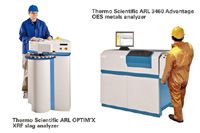
Calibration standards
Hellma's liquid and glass calibration filters are designed for testing spectrophotometers. The company has announced accreditation for the calibration standards according to DIN EN ISO 17025. According to the company, the accreditation ensures the traceability of calibrations carried out to references of NIST, by which an international correlation of measurement results is enabled and laboratory procedures gain greater transparency and improved protection of measurement results. Hellma USA, Inc., Plainview, NY; www.hellmausa.com

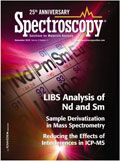
LIBS Illuminates the Hidden Health Risks of Indoor Welding and Soldering
April 23rd 2025A new dual-spectroscopy approach reveals real-time pollution threats in indoor workspaces. Chinese researchers have pioneered the use of laser-induced breakdown spectroscopy (LIBS) and aerosol mass spectrometry to uncover and monitor harmful heavy metal and dust emissions from soldering and welding in real-time. These complementary tools offer a fast, accurate means to evaluate air quality threats in industrial and indoor environments—where people spend most of their time.
NIR Spectroscopy Explored as Sustainable Approach to Detecting Bovine Mastitis
April 23rd 2025A new study published in Applied Food Research demonstrates that near-infrared spectroscopy (NIRS) can effectively detect subclinical bovine mastitis in milk, offering a fast, non-invasive method to guide targeted antibiotic treatment and support sustainable dairy practices.
Smarter Sensors, Cleaner Earth Using AI and IoT for Pollution Monitoring
April 22nd 2025A global research team has detailed how smart sensors, artificial intelligence (AI), machine learning, and Internet of Things (IoT) technologies are transforming the detection and management of environmental pollutants. Their comprehensive review highlights how spectroscopy and sensor networks are now key tools in real-time pollution tracking.